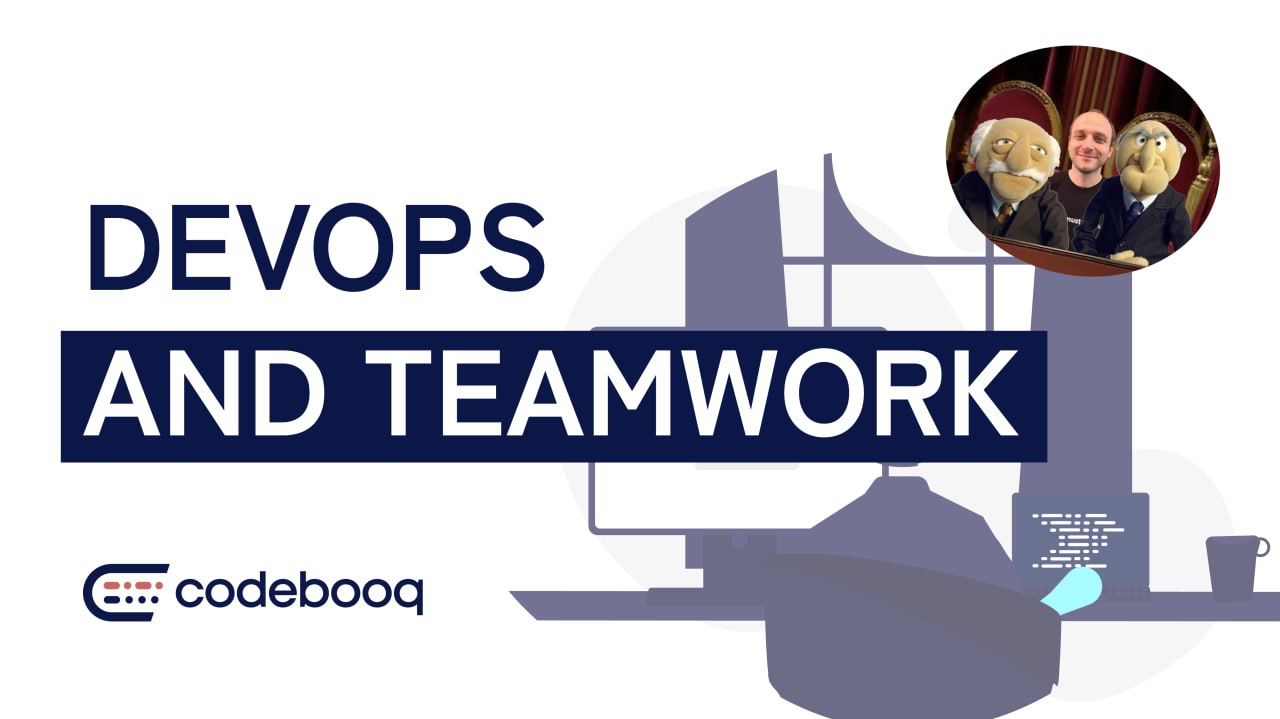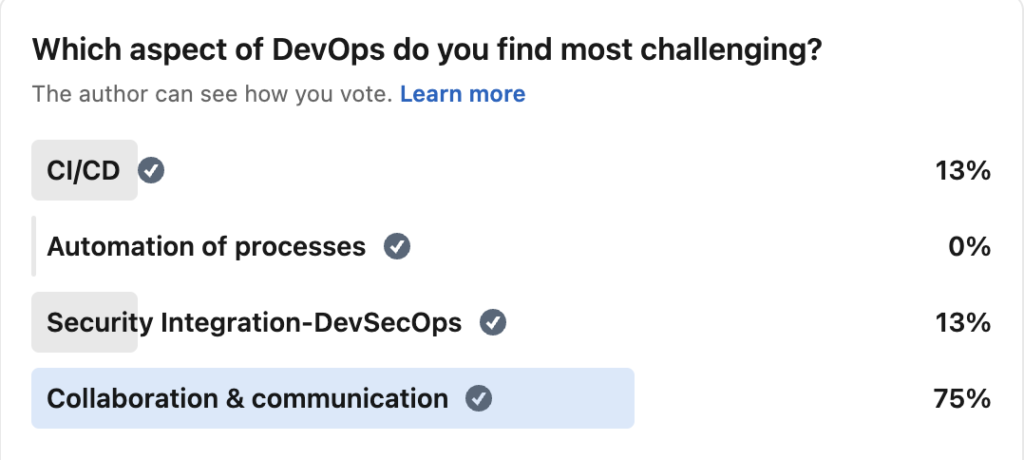
Recently, we ran a LinkedIn poll asking our followers which aspect of DevOps they find the most challenging. Surprisingly, the results showed that collaboration and communication are something most people struggle with. So today, we’re breaking down the strategy to improve teamwork in DevOps environment. Buckle up!

DevOps combines development, security, and operations into a seamless approach that many organizations prefer over traditional IT methods. The main goal of DevOps is to ensure the smooth building, testing, and deployment of software. However, various steps can lead to minor issues that become major obstacles. Often, these problems arise from poor communication, hindering teamwork and collaboration within the DevOps team.
Initial setup of DevOps procedures is time consuming, frustrating, annoying, there will be swear words but we promise you, it leads to greener pastures. Some of you might die of dysentery along the way (some of us are old enough to have played Oregon Trail), but those that survive will be able to build a new life.
This article explores how improving communication, organization, and teamwork can make your DevOps team more effective and add value to your business. Spoiler: It involves a lot of talking and less finger-pointing.
Why DevOps Matters
Let’s use a cooking analogy: the development team gathers the ingredients, while the operations team controls the oven. If the oven is heated too early, resources are wasted; if too late, the meal isn’t ready on time. You might get a cake, but it’s probably going to be half-baked or burnt to a crisp.
Similarly, without proper collaboration in DevOps, the timing and availability of resources will be misaligned. The development team writes code, designs new features, and tests them. Meanwhile, the operations team manages servers, scaling, bandwidth, security, and backups. Problems arise when the development team is ready to deploy without notifying the operations team in advance, often leading to insufficient bandwidth for new features. It’s like a chef serving up a dish without telling the waiter – nobody gets their meal on time, and everyone leaves a bad review.
DevOps aims to solve this by fostering close cooperation between development and operations, forming cross-functional teams, and distributing pressure evenly. Ultimately, users don’t care about internal communication failures or server issues; they only notice if features are unavailable. Therefore, DevOps streamlines deployment, enhancing the user experience. Because nothing says “professional” like a seamless app experience – and nothing says “we have no idea what we’re doing” like constant crashes.
Why Collaboration Matters in DevOps
Good communication is essential in DevOps. Without it, efficiency, creativity, and results suffer. Sometimes, information gets stuck in silos, even though Dev and Ops should work as one team. This can leave some team members out of the loop on current projects and requests. Think of it like a game of telephone, but with more frustration and less childhood nostalgia.
Better collaboration between Dev and Ops leads to shared responsibilities and new ideas, sparking innovative solutions. Improved collaboration in DevOps brings several benefits:
- Innovation: Working together inspires new ideas – who knew other people had brains too?
- Productivity: Teamwork boosts efficiency, just like those group projects in school, except everyone actually works.
- Transparency: Clear roles reduce misunderstandings, because guessing games should be left to game night.
- Reliability: A cooperative team builds trust, and let’s face it, trust falls are a terrible way to test this in the office.

Strategies to Enhance DevOps Collaboration
Merging a DevOps team can be challenging, with initial friction between development and operations teams potentially causing tension. Avoiding negative experiences from the start is crucial. Kind of like how avoiding soggy cereal makes breakfast more enjoyable.
1. Define Clear Goals
First, make sure everyone on the team understands the project’s goals. Set broad objectives for the DevOps team, such as planning, testing, deploying, and maintaining solutions more efficiently, or focusing on automating and integrating development initiatives. Write down these goals for future reference, especially during challenging times – like when someone accidentally deletes the production database.
Also, set specific goals for each project. Knowing why certain features are developed early on makes the production cycle smoother. Because nothing screams “professional” like having a plan.
2. Foster a Unified Team Approach
Next, encourage collaboration between development and operations teams by promoting a unified team approach. Use shared tools like Lucidspark, Jira, and Slack to increase transparency and involvement. Consider it the digital equivalent of singing “Kumbaya.”
3. Embrace Diverse Perspectives
Ensure all voices are heard and avoid letting one person dominate conversations or projects. Use tools such as Lucidspark to give every team member equal opportunities to contribute during brainstorming sessions. Remember, even the quiet ones might have the next big idea – or at least a decent meme to share.
4. Establishing a Clear Roadmap
Deployment can become confusing quickly. Use tools like Lucidspark, Teamgantt, etc., to create transparent, real-time updated roadmaps that highlight interdependencies, provide a detailed view of processes, and align development and operations on priorities. This visual representation reduces errors and facilitates automation, serving as a single source of truth for DevOps work. Or at least a single source of fewer arguments.
A well-maintained roadmap also acts as a valuable tool for post-release analysis. After releases, identify areas for improvement, allowing for continuous progress in each lifecycle. Keep roadmaps short (around three months) to maintain focus on high-priority tasks. Avoid text-only roadmaps, as they lack the clarity and simplicity of visual ones. Remember, nobody likes reading War and Peace when a comic strip will do.
5. Share knowledge
Include DevOps people in dailies and planning so they have some idea what’s happening in near future, because they’re also busy and might need time to prepare the infrastructure, and might stop the dev team from going into dire straits that are not navigable with current infrastructure.
Likewise, have at least one dev learn a bit of what DevOps does and what tools they use, so he can communicate the team’s needs more clearly. It’s very annoying when a dev says something is not working once deployed without having any idea about infrastructure, e.g. that there is an outbound firewall.
6. Clear and documented procedures
Clear and documented processes need to be in place, if anybody needs something that they know who the person to ask is. But don’t hinder your team so much, that only one person can do a task, and if they’re on vacation or busy everything grinds to a halt. If something happens to a person, are there people that have enough knowledge and rights to take over that person’s tasks? Let’s say if you have one DevOps person that is traveling somewhere and doesn’t have internet and a server needs restarting.
7. Treat DevOps same, if not better, than developers
It’s easy to come to the fallacy that they’re not doing anything when everything is working. Trust us, they’ve worked hard, and continue to tweak and improve the processes behind the scenes. Likewise it’s even easier to come to the conclusion that they’re not doing anything when something is not working. DevOps is a lot of knowledge with a dash of trial and error, some prayers to various deities and a touch of black magic, just in case.
Continuous Improvement Through Collaboration
Effective collaboration leads to ongoing product improvement. When teams communicate and work closely, they can identify and fix inefficiencies over time, prioritize projects better, and understand each other’s strengths and weaknesses. Because nothing says “teamwork” like a shared disdain for inefficient processes.
A company’s success relies on its development process, which in turn depends on the collaboration of its team members. By fostering effective communication and teamwork, your DevOps team can achieve greater efficiency and deliver better results.
And remember, the only thing more tragic than a server crash is a joke about it. Keep the lines of communication open, and may your deployments be as flawless as your coffee is strong! Cheers to fewer bugs and more high-fives!
Don’t be afraid to change something if it doesn’t work or you think it could work better. You can always go back.